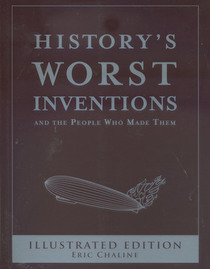Anytime an author writes a book like this (such as, 100 events which changed history, 1000 greatest people in history, etc.), you have readers who will question their choices, and, quite frankly, I enjoy doing that.
I was extremely disappointed with this book and the author's choices, many of which seemed ridiculous. Here are just some examples, Karaoke?, Betamax?, Spectro-Chrome Therapy?, Switchblades?, Crinolines? The list goes on. If these are the worst inventions in history, then we are pretty lucky.
Especially when he missed so many obvious worst ones. To preface one which I really think he overlooked, I decided the author has an obvious liberal bent. He focused on things which he felt had bad effects, as often espoused by liberals, when they are also balanced by their good effects. One is Petroleum. Imagine our world without the internal-combustion engine. While the author makes good points about the ill effects, just try imagining the mounds of horse, mule and donkey manure on our streets---and their side effects---if we didn't have gas-driven vehicles (cars, trucks, planes, trains). Before gasoline and diesel, trains were driven by coal, not something extremely friendly to our atmosphere. The use of coal to heat homes is why London was often called "The Great Smoke." I support many liberal views in regard to our environment, but there are two sides to every story.
But my biggest gripe is why the author came down so hard on philosophies such as Capitol Punishment, Dianetics, Phrenology, etc., and yet never mentions Communism. This philosophy was responsible for the often cruel deaths of untold tens of millions or people, and it is still being practiced upon suffering peoples in North Korea, China and elsewhere. How could he have missed that one? Or, better yet, why did he avoid mentioning it?
Then there are the author's facts. When discussing the Dutch Tulip Mania, he states one bulb sold for "(approximately U.S. $35.000 at current prices) over 16 times the average annual wage for a workman." This book was published in 2009, and 1/16th of that amount is $2,187.50. Where was that the average *annual* wage in Britain, where the author resides, in 2009?
Then he also credits extreme hairstyles for bringing down the French Empire in the late 18th century. As a reader of history, just off the top of my head I could list at least a half-dozen better reasons why the French Revolution occurred.
I could go on, but prefer to use my time and energy elsewhere. Such as reading better books. If the author decides to write any more books, they should be in the fantasy genre.
I was extremely disappointed with this book and the author's choices, many of which seemed ridiculous. Here are just some examples, Karaoke?, Betamax?, Spectro-Chrome Therapy?, Switchblades?, Crinolines? The list goes on. If these are the worst inventions in history, then we are pretty lucky.
Especially when he missed so many obvious worst ones. To preface one which I really think he overlooked, I decided the author has an obvious liberal bent. He focused on things which he felt had bad effects, as often espoused by liberals, when they are also balanced by their good effects. One is Petroleum. Imagine our world without the internal-combustion engine. While the author makes good points about the ill effects, just try imagining the mounds of horse, mule and donkey manure on our streets---and their side effects---if we didn't have gas-driven vehicles (cars, trucks, planes, trains). Before gasoline and diesel, trains were driven by coal, not something extremely friendly to our atmosphere. The use of coal to heat homes is why London was often called "The Great Smoke." I support many liberal views in regard to our environment, but there are two sides to every story.
But my biggest gripe is why the author came down so hard on philosophies such as Capitol Punishment, Dianetics, Phrenology, etc., and yet never mentions Communism. This philosophy was responsible for the often cruel deaths of untold tens of millions or people, and it is still being practiced upon suffering peoples in North Korea, China and elsewhere. How could he have missed that one? Or, better yet, why did he avoid mentioning it?
Then there are the author's facts. When discussing the Dutch Tulip Mania, he states one bulb sold for "(approximately U.S. $35.000 at current prices) over 16 times the average annual wage for a workman." This book was published in 2009, and 1/16th of that amount is $2,187.50. Where was that the average *annual* wage in Britain, where the author resides, in 2009?
Then he also credits extreme hairstyles for bringing down the French Empire in the late 18th century. As a reader of history, just off the top of my head I could list at least a half-dozen better reasons why the French Revolution occurred.
I could go on, but prefer to use my time and energy elsewhere. Such as reading better books. If the author decides to write any more books, they should be in the fantasy genre.





